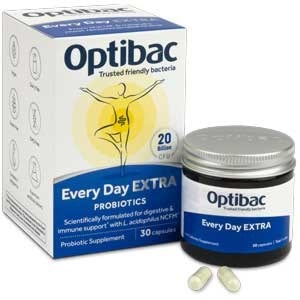The Research Myth
The Myth:
"All probiotic studies are of equal significance."
Research says:
Some probiotic strains have lots of good research, and others have none.
There are many different types of research – from simple research in a test tube or petri dish in a lab (known as in-vitro research) to more comprehensive research in a clinic or hospital where people are given the probiotic or a placebo and their symptoms are measured over a few weeks or months (known as clinical research). Read more about our research.
One of the easiest ways of finding out if a probiotic supplement has been researched is to look at the strains it contains. For example if the ingredients section on the packaging of the probiotic supplement lists L.acidophilus NCFM® (Healthcare professionals can view this strain in the Probiotics Database: L. acidophilus NCFM®) you can type this strain name into a search engine, or a database of scientific research such as PubMed, to see what research publications are available. For example ‘NCFM’ in PubMed yields over 100 publications, including references to trials demonstrating this strains effectiveness for abdominal cramps and occasional bloating. It can be difficult to find information about research on probiotic supplements where the strains are not included on the packaging e.g. ‘L. acidophilus’ in the ingredients list could mean any acidophilus strain ie. L. acidophilus NCFM® or L. acidophilus Rosell-52, and these strains have completely different research behind them1,2. A probiotic may even contain a strain of L. acidophilus which has no research. So a key marker of transparency with regards to research is if the full strain names are included in the ingredients list of a probiotic supplement.
L. acidophilus NCFM® can be found in Every Day EXTRA.

Whilst in-vitro evidence is important, and can be significant to demonstrate factors like survival at different pH levels, and even ability to adhere to epithelial cells, generally speaking clinical trials (where products are tested on human beings, for certain benefits) provide better evidence to demonstrate a probiotic’s effect on the body. A probiotic may have seen many ‘studies’, yet these could refer to in-vitro or animal studies, rather than human clinical trials. What’s more, clinical trials have different standards - some have a high number of participants, others only a handful. Some clinical trials are double-blinded and placebo controlled and others are not. It is important, that when we hear words such as ‘best studied’ or ‘proven’, we question what this really means.
Look out for:
A probiotic range with documented clinical trials.
Further Reading
Research - is it all equal?
This myth has been busted by Megan Crowch, BSc (Hons) Physiology, Herbal Medicine Diploma (IRH practicing member).
References
- Ringel-Kulka et al. (2011) Probiotic bacteria Lactobacillus acidophilus NCFM and Bifidobacterium lactis Bi-07 versus placebo for the symptoms of bloating in patients with functional bowel disorders: a double-blind study. J Clin Gastroenterol; 45, 6: 518-25.
- Messaoudi et al. (2011) Beneficial psychological effects of a probiotic formulation (Lactobacillus helveticus R0052 and Bifidobacterium longum R0175) in healthy human volunteers. Gut Microbes; 2, 4: 256-61.
You might also be interested in:
The Food Myth
The Antibiotic Myth
The Strain Myth
The Survival Myth
The Numbers Myth
The Cure-All Myth
The Billions Myth
The Fridge Myth
